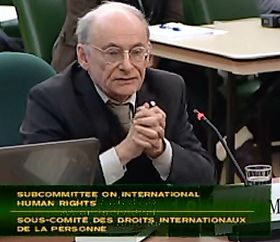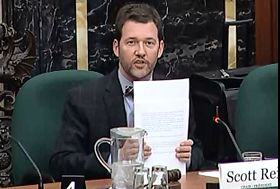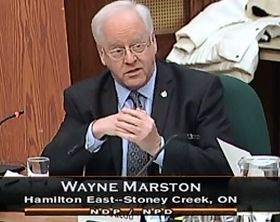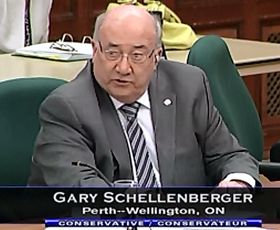Canadian Parliament Holds Hearing on the Organ Harvesting of Falun Gong Practitioners in China (Photos)
(Minghui.org) On February 5, the Subcommittee on International Human Rights of the Standing Committee on Foreign Affairs and International Development of the Canadian Parliament held a hearing on the organ harvesting of Falun Gong practitioners in China.
The hearing
David Matas (left), Parliament Member Judy Sgro (middle), and David Kilgour
At the one-hour hearing, David Matas, a famous international human right lawyer, and David Kilgour, the former Canadian diplomat and former parliament member, reported the results of their investigation of the organ harvesting and answered questions from parliament members.
The hearing was hosted by Hon. Scott Reid, Hon. Irwin Cotler, and Hon. Wayne Marston. The members of the subcommittee attended the hearing.
Investigators presented evidence and called for help to stop the organ harvesting
David Kilgour, former Canadian diplomat and parliament member
David Kilgour briefly reviewed the facts of the persecution of Falun Gong practitioners in China since 1999. He said that since 2001, thousands of practitioners were killed, and their organs were sold to patients from China and overseas. Mr. Kilgour and Mr. Matas concluded that between 2000 and 2005, the sources of 41,500 organ transplants in China were from Falun Gong practitioners.
David Matas, a famous international human right lawyer
In his speech, David Matas said: “The Communist Party conducted a prolonged, persistent, vitriolic campaign of incitement to hatred against Falun Gong prompting their marginalization, depersonalization and dehumanization in the eyes of many Chinese nationals. There were 70 to 100 million Falun Gong practitioners before 1999. After the persecution started, they have been arrested in huge numbers, hundreds of thousands and placed in forced labour camps. The United States Department of State's Country Reports report that foreign observers estimate that Falun Gong adherents constitute at least half of the inmates in China’s forced labour camps, which are both arbitrary detention slave labour camps and vast live organ donor banks.”
“Many Falun Gong practitioners are the subject of formal disappearance complaints by family members. The authorities often refuse to notify the families of their detention; as well, these practitioners are not allowed to contact their families. Many more practitioners, in attempt to protect their families and communities, have not identified themselves once arrested. These unidentified are a particularly vulnerable population.”
“Investigators made calls to hospitals throughout China, claiming to be relatives of patients needing transplants, asking if the hospitals had organs of Falun Gong for sale on the basis that, since Falun Gong through their exercises are healthy, the organs would be healthy. We obtained on tape, transcribed and translated admissions throughout China.“
“Falun Gong practitioners who were detained and later got out of detention and out of China testified that they were systematically blood tested and organ examined while in detention. The blood testing and organ examination could not have been for the health of the Falun Gong since they had been tortured; but it would have been necessary for organ transplants and for building a bank of 'donors' for locating matching organs.”
“Waiting times for transplants of organs in China are days and weeks. Everywhere else in the world waiting times are measured in years. Transplants of long dead donors are not viable because of organ deterioration after death. The survival period for a kidney is between 24 48 hours and a liver about 12 hours. A short waiting time for a deceased donor transplant means the presence of a large bank of living organ sources ready to be killed on order to assure such short waiting times.”
After giving many detailed evidence, Mr. Matas pointed out: “There is no other explanation for the transplant numbers than sourcing from Falun Gong. China is the second largest transplant country in the world by volume after the US. Yet, until 2010 China did not have a deceased donation system and even today that system produces donations which are statistically insignificant. The living donor sources are limited in law to relatives of donors and officially discouraged because live donors suffer health complications from giving up an organ.”
He said: “The Government of China does acknowledge that the overwhelming proportion of organs for transplants in China comes from prisoners but asserts that the prisoners who are the sources of organs are all sentenced to death. Yet, the number of prisoners sentenced to death and then executed that would be necessary to supply the volume of transplants in China is far greater than even the most exaggerated death penalty statistics and estimates. Moreover, in recent years, death penalty volumes have gone down, but transplant volumes, except for a short blip in 2007, remained constant.”
Ms. Matas said: “Our report has a myriad of recommendations. I would like to ask The Committee to initiate a resolution to condemn China’s forced organ harvesting from prisoners including Falun Gong practitioners. I would also like to highlight a few particularly to the Parliament and Government of Canada which include asking parliament to enact legislation to combat international organ transplant abuse; provide guidelines for the consent of the Attorney General for prosecution for torture; enact legislation to remove state civil immunity for the worst offences known to humanity, including the killing of Falun Gong for their organs; immigration control against those participated in forced organ harvesting; establishing investment guidelines for foreign investment on respecting human rights. Canada should use every possible channel and opportunity to ask Chinese government to stop the persecution of Falun Gong, especially at meetings with top Chinese leaders and at international forums, such as Universal Periodical Review at UN.”
Mr. Matas concluded: “We commend the Subcommittee for convening this hearing. The issue is serious enough to justify action. In principle, the worst victims need to be given the most attention, the highest priority. This Subcommittee should follow that principle when addressing human rights violations in China by a continuing focus on organ transplant abuse in China, the victimization of prisoners of conscience, and, in particular, Falun Gong.”
Parliament Members believed that the evidence are convincing
After the hearing, several parliament members accepted interviews. They all expressed that the evidence of organ harvesting are convincing and the Canadian government should take actions to stop it.
Hon. Scott Reid, chair of the subcommittee
Hon. Scott Reid, chair of the subcommittee, said: “The issue of organ harvesting is an issue that has been getting more and more publicity. And it is thanks largely to these two witnesses Mr Matas and Mr Kilgour. And it is just a clear example of a human rights issue that is novel or new. This problem didn't exist a few years ago but as it becomes easer and easer to conduct these harvesting activities it is becoming a bigger and bigger problem.”
He said: “ I think they have demonstrated their evidence pretty effectively.”
Hon. Wayne Marston, vice chair of the subcommittee
Hon. Wayne Marston, vice chair of the subcommittee, expressed that he accepted the conclusions made by Mr. Kilgour and Mr. Matas. He said: “We had hoped to see significant change in China but the evidence so far isn't that that has happened. That is what prompted the committee to take a further look at the situation. [The investigators] were consistent with the stories that we heard in the past. They brought us some evidence beyond what we had previously heard and they also indicated to us the international community, other than the United States and Australia and other places that are looking at this. So it is important that Canada take a good solid look at the situation.”
Hon. Irwin Cotler, vice chair of the subcommittee
Hon. Irwin Cotler, vice chair of the subcommittee, said: “I thought their presentation today was exemplary. I think they have put forward more evidence with respect to the illegality of the organ harvesting in China and it remains for the Chinese authorities to rebut that evidence which they have not yet done and as I said today until such time as the Chinese authorities can rebut that evidence, that evidence stands.”
Hon. David Sweet
Both Hon. David Sweet and Hon. Judy Sgro also believed that two investigators have offered powerful and convincing evidence for the organ harvesting of Falun Gong practitioners in China.
Hon. Reid believed that the hearing is the first thing to do to stop the human right violation. He said: “That is the first thing. But there are some interesting thoughts out of the suggestions. Mr Matas suggested that when Canada is dealing with foreign takeover of Canadian companies. Given the fact that Canada has a substantial amount of, well we are a good place to invest. There are lot of foreign state owned enterprises that are coming here. Cenoc being one example. That we should be looking at their human rights record as one of our criteria which has historically not been one of our criteria. Perhaps the criteria ought to be adjusted accordingly.”
Hon. Sgro expressed: “Mr Cotler, my Liberal colleague, is working on a private members bill he will introduce as soon as he can get it finalized. And lets get it through the House of Commons and would hope that it will be supported by all of the members in the House of Commons. And a very strong message that Canada is going to stand up for human rights and is going to stand up and defend people who are clearly being persecuted and abused.”
Hon. Gary Ralph Schellenberger
Hon. Gary Ralph Schellenberger said: “Every time my Prime Minister talks to the Chinese government human rights are brought up. I think that my suggestion to the Foreign Affairs Minister is that we do all we can to stop the human organ harvesting in China.”
David Kilgour and David Matas told the reporter that many countries and organizations around the world have already taken actions against the organ harvesting, including United Nations, European Parliament, U.S.A., Australia, France, Canada, Taiwan, Israel, and Belgium.
Mr. Matas told the parliament members that he has submitted 166,000 signatures from 36 European countries to UN High Commissioner for Human Rights, which asked the UN to conduct an independent investigation on the organ harvesting.
Parliament members: more people need to know about this
Hon. Sgro said: “We have an opportunity to get those voices out there to be much stronger and hopefully next year at this time there will be millions of people more who have become aware of what is going on in China and how the Falun Gong are being persecuted and taken away as a result of this persecution in China. So I am very pleased to see that this is happening today and really applaud the committee for taking that initiative to bring this issue to the forefront. People get away with things when people don't know. But when enough people hear about these kinds of things, they would be as appalled as I am that this is allowed to continue.”
Hon. Brent Rathgeber said that the investigators have presented detailed and powerful evidence of the organ harvesting. He hopes that the information will spread out and more people will know about it. He believes that more people know about it, sooner it will end.








